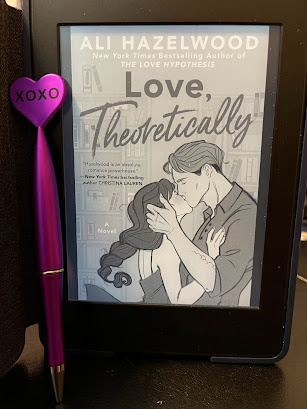 |
| In which Valentine's Day "party favors" from work prove useful...and bring some color to Kindle Paperwhite cover —Taken with an iPhone 13 |
The journey outside of my literary comfort zone last year felt like a bumpy ride. I went from reviewing a supernatural romance novel in poetry, which I enjoyed, to struggling through a rom com that seemed to make light of mental health issues by using them as comedic hooks while leaving narrative-driving dialogue to sit on the kitchen counters of that house in Maine. It is very much like being in the throes of a reciprocated crush, where the enthusiasm and anticipation can make even the most pragmatic person forget to look up the reviews for a local restaurant. The decor might be stylish and ritzy, but when the food turns out to be cold, overly seasoned, or has the wrong toppings, the romance gets sucked right out of the atmosphere.
Even if the place went south, the date never faltered down the same path.
Ali Hazelwood's book, Love, Theortically lines up in parallel to said date where the usual fare of (potentially) cheap romance and rom com literature does not stop this love story from doing its own thing and, well, doing it brilliantly. The most interesting thing about Love, Theortically is the fact it does not start as a romance at all. It instead starts with recent PhD graduate and adjunct professor, Elsie Hannaway, applying for a tenured position at the Massachusetts Institute of Technology in the hopes of saying goodbye to both adjunct life and to playing the roles of multiple Elsies in the gig economy through the fake-dating app, Faux.
The narrative properly gets rolling when MIT Physics Chair, Monica Salt, invites Elsie for an interview and dinner at the Miel as one of two candidates. There, she meets the bane of theoretical physics and possible threat to her career: Experimental Physicist Dr. Jonathan Smith-Turner or just Jack Smith-Turner. (Ironically enough, I imagined him being played by real-life theoretical physicist, Brian Wecht. More on comfort zone hooks shortly.)
It already goes without saying that I appreciate everyone who voted in last year's poll alongside my Mom and (by proxy) my sister who recommended alternative titles in the first place.
I mean it more so after reading Hazelwood's book and I do not regret spending around US $11.70 on the Kindle edition. The writing is smooth with both the dialogue and Hannaway's stream of consciousness driving the narrative forward. Every hook did not merely just made sense, but made it a book I looked forward to reading whether before bed or during the day.
Love, Theoretically is also a romance novel which is partly steeped in my own comedy comfort zone: Elsie's gigs for Faux reminded me of Spaced's Tim and Daisy who faked being a couple in order to rent a flat from the landlady, Marsha. Brian Wecht, who I mentioned two paragraphs ago, playing another major role in making me close to home in an unfamiliar, literary landscape. It also helped that the book was unashamedly geeky across the board with references to Twilight, 2001: A Space Odyssey, and other obscure films among other iconic media...
...aside from being steeped in primarily physics and academe. Anyone who might be unfamiliar with the sciences will not be lost in the stacks—Hazelwood keeps the explanations about physics studies brief and simple.
There are some speed bumps near the end in the form of heavily intimate scenes that take up a couple chapters. I do not usually comment on these for books in general but here it felt like I was trying to get back to the plot, which for some reason, felt like it was almost wrapped up beforehand. At the same time—and much like Arthur Dent and Fenchurch's flying ritual in So Long and Thanks for All the Fish—it felt like it those scenes were supposed to be there to help develop character in a way that I do not think I can (or should) answer. Much like Adams in Dent's fourth adventure, Hazelwood anticipates this in a way which I thought was just as clever, if not more so, with a simple text message to Elsie. The format change was enough to get me to pay closer attention to the story again without telling me to skip chapters for the sake of character cameos.
The more important result of that is something I will not spoil, but ultimately subverts Elsie's main challenge into one that was more personal and ongoing to begin with. In short, it made me appreciate the book not just as a mere romance novel, but a story in which its both Elsie versus the world and herself similar to something like Jaz Jazalyn's Rose: Future Heart from last year.
Love, Theoretically did not start out as a love story, but both manages to meander into one while making it work in the most improbable ways...according to a reviewer properly unfamiliar with love stories en masse. It's not exactly a trek into daunting new ground thanks to the geekiness of both the setting and the characters themselves who helped make me feel comfortable on new literary ground. The story was not a shipwreck by any means, but a proper, ironclad vessel swiftly moving across the Atlantic with a galley that doles out the proper amount of spices and dressing for any salads or meals. A second trip might be in order...
In Sum: Evening dinner for two at a restaurant with soothing aesthetics and delicious food with a coffeehouse poetry reading followed by a band playing at 8pm. Minor scheduling conflicts pending—4 out of 5
...and yes, the title is also a nod to Brian Wecht in his new venture as jazz musician, Trey Magnifique. His debut album, Mature Situations is lovely and, well, fitting. Do give it a listen!